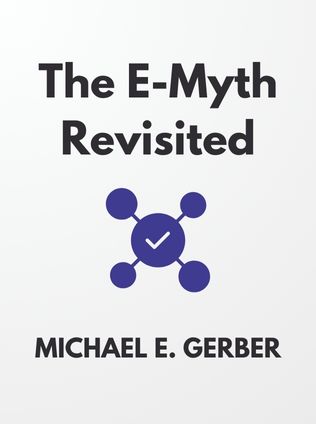
The E-Myth Revisited
By Michael E. Gerber
Published 09/1985
About the Author
Michael E. Gerber is a renowned business author, coach, and entrepreneur who has significantly impacted the way small businesses are perceived and operated. With over four decades of experience, Gerber has been a guiding light for countless entrepreneurs, helping them transform their businesses from chaotic, struggling ventures into thriving, sustainable enterprises. His expertise lies in identifying the common pitfalls that small business owners face and offering practical, actionable advice to overcome them.
Gerber’s work is rooted in his deep understanding of the entrepreneurial journey. He recognizes that many entrepreneurs start with a passion for their craft but often lack the broader business skills necessary to grow and sustain their ventures. His seminal work, The E-Myth Revisited: Why Most Small Businesses Don’t Work and What to Do About It, has become a classic in the field, offering a comprehensive guide for small business owners who aspire to achieve not just survival, but true success. The book's title itself, "E-Myth," refers to the Entrepreneurial Myth, the mistaken belief that most small businesses are started by entrepreneurs brimming with business acumen and a solid plan. Gerber debunks this myth, revealing that most businesses are actually started by technicians – people skilled at a specific craft but not necessarily adept at running a business.
Main Idea
The central thesis of The E-Myth Revisited is that the majority of small businesses fail not because their owners lack dedication or technical skill, but because they fall into the trap of what Gerber calls the Entrepreneurial Myth. This myth is the false assumption that someone who understands the technical work of a business can also understand the business that does that technical work. Gerber argues that this assumption leads to disastrous outcomes because it ignores the crucial distinction between working on your business and working in your business.
In essence, Gerber’s message is that for a business to thrive, its owner must adopt three distinct roles: the Entrepreneur, the Manager, and the Technician. Each of these roles is critical to the success of the business, but they require different mindsets and skills. The Entrepreneur is the visionary, the one who looks ahead and imagines what the business could be. The Manager is the planner, the one who creates order out of the Entrepreneur’s chaos and ensures that systems are in place to make the vision a reality. The Technician, on the other hand, is the doer, the one who gets the hands-on work done. According to Gerber, the fatal flaw of most small businesses is that they are run by Technicians who are too focused on doing the work and neglect the necessary roles of Entrepreneur and Manager.
Table of Contents
- The Entrepreneurial Myth
- The Turn-Key Revolution
- Building a Small Business That Works
- Infancy: The Technician’s Phase
- Adolescence: Getting Some Help
- Maturity and the Entrepreneurial Perspective
- Your Primary Aim
- Your Strategic Objective
- Your Organizational Strategy
- Your Management Strategy
- Your People Strategy
- Your Marketing Strategy
- Your Systems Strategy
The Entrepreneurial Myth
The book opens with a powerful assertion that challenges the conventional wisdom surrounding small business ownership. Gerber introduces the concept of the Entrepreneurial Myth, or E-Myth, which is the false belief that anyone who starts a small business is an entrepreneur. He explains that most small businesses are not started by entrepreneurs, but by technicians who have had an "entrepreneurial seizure" – a moment where they mistakenly believe that because they understand the technical work of a business, they can successfully run a business that does that work.
Gerber uses the story of Sarah, a struggling pie shop owner, to illustrate the E-Myth in action. Sarah is passionate about baking, and her pies are a hit among her friends and family. Encouraged by their praise, she decides to open her own pie shop, believing that her baking skills will translate into business success. However, she soon finds herself overwhelmed by the demands of running a business. She is not only the baker but also the accountant, the marketer, the manager, and the janitor. The joy she once found in baking is replaced by stress and frustration, as she realizes that her business is failing despite her best efforts.
Sign up for FREE and get access to 1,400+ books summaries.
You May Also Like
The Subtle Art of Not Giving a F*ck
A Counterintuitive Approach to Living a Good Life
By Mark MansonRich Dad Poor Dad
What the Rich Teach Their Kids About Money - That the Poor and Middle Class Do Not!
By Robert T. KiyosakiHow To Win Friends and Influence People
The All-Time Classic Manual Of People Skills
By Dale CarnegieQuiet: The Power of Introverts
The Power of Introverts in a World That Can't Stop Talking
By Susan Cain



















